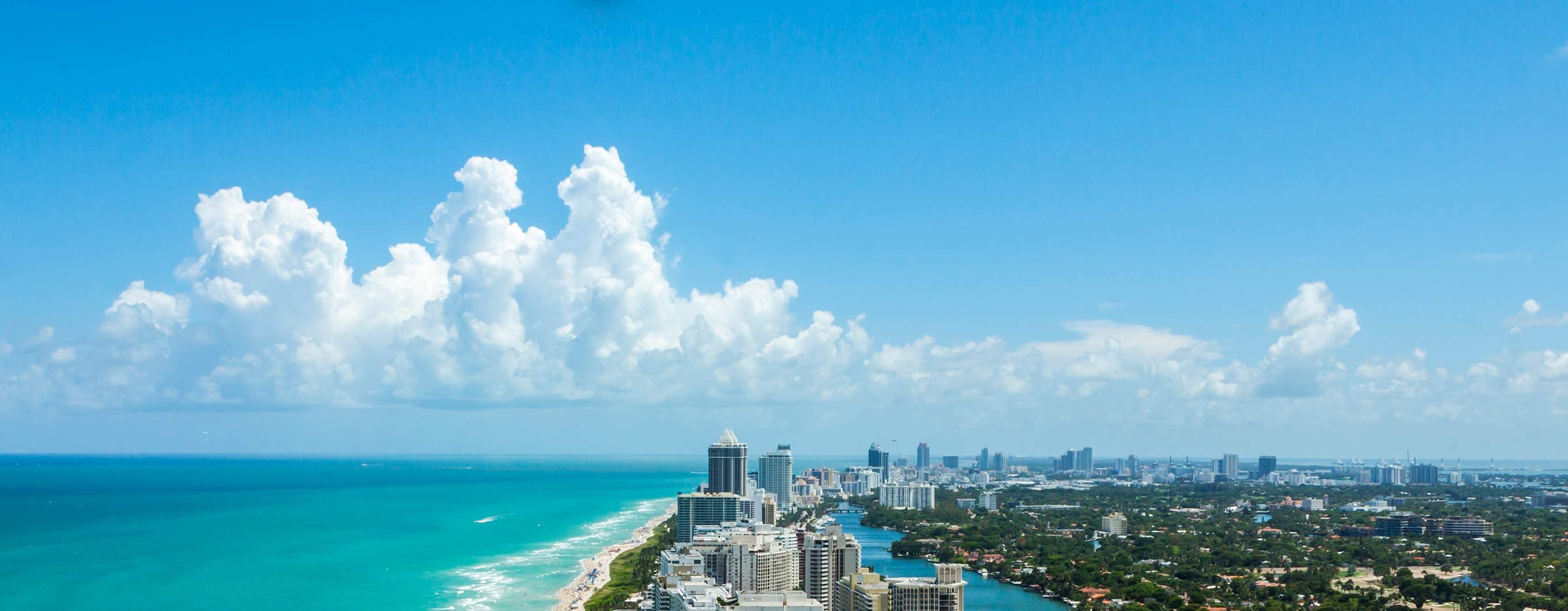
Homeowners Insurance in Florida
While Florida's warm weather is attractive, living in the Sunshine State has challenges. Frequent natural disasters and litigation expenses have driven up Florida's home insurance rates in recent years. However, Florida residents heavily purchase homeowners insurance to protect their property and personal belongings from natural calamities.
This blog covers everything you need to know about homeowners insurance in Florida. We will also explore some effective strategies to lower your yearly insurance premium.
What is the average homeowners insurance cost in Florida?
The cost of Florida homeowners insurance has increased over the past five years. Below is a table showing the average insurance costs during this period:
Year | Average Annual Cost (USD) |
|---|---|
2024 | $11,759 |
2023 | $10,996 |
2022 | $6,000 |
2021 | $2,437 |
2020 | $2,165 |
What factors influence my home insurance rate?
Several factors influence the cost of homeowners insurance in Florida (FL). Understanding these factors helps you effectively manage insurance expenses and make well-informed decisions about coverage. Below are common factors that influence Florida (FL) homeowners insurance rates:
- Areas prone to catastrophic disasters like floods and hurricanes tend to have higher insurance costs.
- Homes with higher value or high replacement costs generally have higher premiums.
- Dwellings built with durable materials and modern construction techniques often have lower insurance rates, while older homes or those with outdated electrical, plumbing, or roofing systems may have higher premiums.
- Choosing a higher deductible often lowers your premium, while a lower deductible leads to a higher premium.
- High-cost or frequent claims can lead to higher premiums.
- The amount and type of coverage chosen impact the rate. Additional coverage options or endorsements for items such as jewelry, electronics, or home offices can raise the premium.
- Insurers may offer reduced rates to those with higher credit scores, as they are counted as lower risks.
- Homes with safety features like alarm systems, smoke detectors, and hurricane shutters may qualify for discounts, potentially reducing the insurance rate.
Common insurance discounts in Florida
When it comes to homeowners insurance in Florida, there are several ways to lower your premiums, such as taking advantage of various discounts. Here's a breakdown of some common discounts that could help you save money on your insurance policy:
- Bundled policy discount: This discount, also known as a multi-policy discount, is offered when you purchase different types of insurance from the same provider. By consolidating your policies, you're giving more business to one insurer and getting a discount in return.
- Early signing discount: You can qualify for an early signing discount if you purchase your homeowners insurance policy before your current policy expires or close on a new home.
- New home discount: Newly constructed homes often qualify for discounted insurance rates. This is because they are built with modern materials and are less likely to experience wear and tear, which reduces the likelihood of costly claims.
- Loyalty discounts: House insurance providers frequently offer loyalty discounts to long-term clients. After being with the same insurer for 3 to 5 years, you might see a 5% premium reduction, and after six years, this could reach 10%.
- Home improvements: Upgrades to your home, such as installing a new roof, updating electrical or plumbing systems, or adding storm shutters, can lower your insurance premiums.
- Smart home discount: Modern home devices can qualify you for discounts because they help prevent damage and minimize claims. Devices such as smart thermostats, smoke and carbon monoxide detectors, water leak detectors, and home security systems can all contribute to lower premiums.
- No-claims discount: Similar to auto insurance, a no-claims discount rewards homeowners who go without filing a claim for several years. Fewer claims mean lower costs for insurers, who can pass these savings on to you.
- Security or safety measures discount: Installing security and safety devices, such as deadbolt locks, smoke detectors, burglar alarms, and sprinkler systems, can lower your insurance premiums by lowering the risk of theft and fire.
- Retiree discount: You can qualify for a discount if you're 55 or older. Insurers often consider retirees lower risk due to their increased presence at home, which can help prevent break-ins and detect potential hazards early.
Tips for lowering home insurance rates
If you're looking to lower your home insurance premiums, there are several effective strategies to do it. By making targeted adjustments and improvements, you can significantly reduce your insurance costs while maintaining adequate coverage:
- Improve your credit score: Your credit score significantly influences your home insurance rates. Improving your credit score can lower your insurance rates. This includes timely bill payments, maintaining low credit card balances, etc.
- Update your insurance provider on life changes: Significant life events can impact insurance rates. Inform your provider if you've recently paid off your mortgage, gotten married, quit smoking, or improved your credit score. These updates can make you eligible for new discounts.
- Consider home improvements: Upgrading your home can reduce the risk of claims, which ultimately lowers your insurance premiums. Consider improvements such as updating plumbing, reinforcing the roof, or installing security systems.
- Avoid over-insuring: Over-insurance often occurs when you include the value of your land in your coverage amount. Since land isn't at risk from covered risks, insure your home based on the cost of rebuilding rather than its market value to avoid unnecessary premium increases.
- Raise your deductible: If discounts aren't enough to reduce your premiums, consider increasing your deductible. A greater deductible results in higher out-of-pocket costs for covered losses before your insurance coverage begins, but it can reduce your monthly premiums. Note that a larger deductible will raise your financial obligation when a claim occurs.
What does Florida home insurance cover?
Home Insurance Florida offers financial security against potential harm to your property. A typical Florida homeowners insurance policy usually consists of the following protections:
- Dwelling coverage: This includes the construction of your residence, such as roof, walls, floors, and built-in appliances. It covers expenses for repairs or reconstruction if your home is impacted or ruined by protected dangers like hurricanes, fire, windstorms, or lightning.
- Other structures coverage: This applies to detached structures on your premises, like sheds, garages, and fences. It generally includes the same risks as your dwelling coverage.
- Personal property coverage: This safeguards your personal possessions, including furniture, electronic devices, clothing, and other household items. If your possessions are stolen or harmed by covered incidents, this coverage assists in paying for repairs or replacements.
- Loss of use coverage: If your home is not fit for habitation due to a covered loss, this coverage helps with the payment of additional living expenses, including hotel bills and dining expenses, while your home is being fixed or reconstructed.
- Liability coverage: This furnishes protection if you are deemed accountable for injuring others or harming their property. It covers legal fees, medical bills, and repair expenses resulting from occurrences like slips and falls on your property.
- Medical payments coverage: This insurance covers medical costs incurred by visitors injured on your property. However, it is meant for minor injuries and typically has lower coverage limits.
Additional Florida insurance coverage options
Florida's climate and geographical location present distinctive risks for homeowners. While standard Florida homeowners insurance offers essential coverage, supplementary insurance options can protect against specific hazards. Here are some important additional coverage options to keep in mind:
- Sinkhole insurance: Florida is prone to sinkholes, which can cause significant structural damage. While standard homeowners insurance can cover catastrophic ground collapse, it often excludes damage caused by smaller, gradual sinkhole activity. Sinkhole insurance can be added to your policy to mitigate these specific risks.
- Water backup coverage: This coverage guards against damage caused by water clogging from drains, sewers, or sump pumps. It is especially beneficial in areas susceptible to heavy rainfall or where sewer systems risk overflowing.
- Ordinance or law coverage: This coverage addresses the supplementary expenses of bringing your home up to current building codes during repairs or rebuilding after a covered loss. Florida has specific building codes to enhance safety and durability, particularly after hurricanes, making this coverage especially advantageous.
- Jewelry and valuable items coverage: Standard policies typically offer limited coverage for high-value items such as jewelry, art, or collectibles. A scheduled personal property endorsement can ensure adequate insurance for these valuable items.
These additional coverage options can provide comprehensive protection tailored to the unique risks faced by Florida homeowners. Assess your requirements and seek guidance from an insurance provider to ensure you have the appropriate coverage.
What coverage is recommended in Florida?
Given Florida's unique climate and geographical risks, specific insurance coverages are essential for comprehensive protection.
- Flood insurance: Standard homeowners insurance in Florida (FL) does not protect against flood damage, which can occur due to heavy rainfall, storm surges, or overflowing water bodies. The average annual cost of flood insurance in Florida is around $781, according to the National Flood Insurance Program. Given Florida's high vulnerability to flooding, obtain a separate flood insurance policy or obtain it through the National Flood Insurance Program (NFIP). Several types of affordable home insurance in Florida offer flood insurance policies that cover your house structure and personal belongings.
- Windstorm insurance: Although standard policies usually cover wind damage, Florida homeowners may need additional windstorm insurance, particularly in high-risk coastal areas. This coverage safeguards against wind damage from hurricanes and tropical storms.
- Hurricane deductible buy-down: Florida policies often include a hurricane deductible, which can be quite high and is a percentage of your home's insured value. A hurricane deductible buy-down policy enables homeowners to reduce their out-of-pocket costs in the event of a hurricane claim.
Insuring your home in Florida
Protecting a home in Florida involves taking proactive steps to guarantee comprehensive coverage against various potential risks. Assess the value of your home and the necessary coverage, encompassing the dwelling, personal belongings, liability, and extra living expenses. Considering Florida's exposure to hurricanes, floods, and sinkholes, explore additional policies such as flood insurance, windstorm insurance, and sinkhole coverage.
Subsequently, gather Florida home insurance quotes from multiple providers to compare rates and coverage options. Carefully examine the terms of each policy, particularly the deductibles for hurricanes and windstorms, as they may be higher in Florida. Hire an insurance agent or company with a deep understanding of local risks and regulations to customize a policy specific to your requirements.
Lastly, review the policy annually and update it as needed, especially after significantly improving your home or implementing changes in local building codes.
Is Florida homeowners insurance required by law?
Florida housing insurance is not required by law. However, most mortgage lenders mandate it as a condition for loan approval. Lenders require insurance to protect their financial interest in the property in case of damage or loss. Even without a mortgage, obtaining homeowners insurance is highly recommended due to Florida's high risk of hurricanes, floods, and other natural disasters.
Standard homeowners insurance covers the dwelling, personal property, liability, and additional living expenses, but it typically excludes flood damage. Therefore, homeowners in flood-prone areas should consider purchasing separate flood insurance. Additionally, supplementary windstorm and hurricane coverage may be necessary due to the state's vulnerability to hurricanes.
While not legally mandated, having comprehensive homeowners insurance is crucial for Florida homeowners financial protection and peace of mind.
Still have questions?
Interested in learning more about insuring your home in Florida? Here are some frequently asked questions to help you understand the complexities and options available.
Why is it difficult to get homeowners insurance in Florida?
It is difficult to get home insurance in Florida due to the state's high risk of natural disasters, particularly hurricanes, floods, and sinkholes. These frequent and severe weather events lead to significant claims, resulting in higher premiums and insurers exiting the market or limiting new policies. Additionally, litigation costs and regulatory challenges further complicate Florida's insurance.
What happens if you can't get homeowners insurance in Florida?
If you can't get home insurance in Florida (FL) through the private market, you may need to seek coverage through the state's insurer of last resort, Citizens Property Insurance Corporation. Certain Florida home insurance companies provide policies for homeowners who cannot find coverage elsewhere, although these policies may be more expensive and offer less comprehensive coverage.
How many people in Florida do not have homeowners’ insurance?
The exact number of people in Florida without homeowners’ insurance can vary, but many homeowners, particularly those who own their homes outright, may choose to forego coverage. This decision leaves them vulnerable to financial losses from natural disasters and other perils.
Can a non-resident buy a house in Florida?
Yes, a non-resident can buy a house in Florida. There are no state restrictions preventing non-residents or foreign nationals from purchasing property. However, non-residents should be aware of the specific legal, tax, and house insurance considerations in Florida that may apply to their situation and consult with professionals to navigate the process smoothly.
At what age do you stop paying property taxes in Florida?
In Florida, homeowners do not automatically stop paying property taxes at a certain age. However, senior citizens may be eligible for certain property tax exemptions and reductions. For instance, the Senior Exemption offers additional homestead exemptions for residents aged 65 and older who meet specific income requirements. Homeowners should check with their local county property appraiser's office for details and eligibility criteria.



